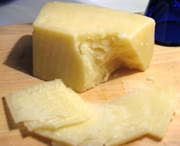Pecorino
From Wikipedia, the free encyclopedia
Pecorino is the name of a family of hard Italian cheeses made from sheep‘s milk. The word pecora, from which the name derives, means sheep. Most are aged and sharp.
Of the four main varieties of mature pecorino, all of which have Protected Designation of Origin (PDO) status under European Union law, Pecorino Romano is probably the best known outside Italy: especially in the United States which has been an important export market for the cheese since the nineteenth century.[1] Most Pecorino Romano is produced on the island of Sardinia, though its production is also allowed in Lazio and in the Tuscan Province of Grosseto.
The other three mature PDO cheeses are the milder Pecorino Sardo from Sardinia, Pecorino Toscano, the Tuscan relative of Pecorino Sardo, and Pecorino Siciliano from Sicily. All come in a variety of styles depending on how long they have been matured. The more matured cheeses, referred to as stagionato, are harder and have a stronger flavour. Some varieties may have spices included in the cheese. In Sardinia, the larvae of the cheese fly are intentionally introduced into Pecorino Sardo to produce a local delicacy called casu marzu.
Pecorino Romano is most often used on pasta dishes, like the better-known Parmigiano Reggiano (parmesan). Its distinctive strong, very salty flavour means that it is preferred for some pasta dishes with highly-flavoured sauces, especially those of Roman origin, such as pasta all’amatriciana.

